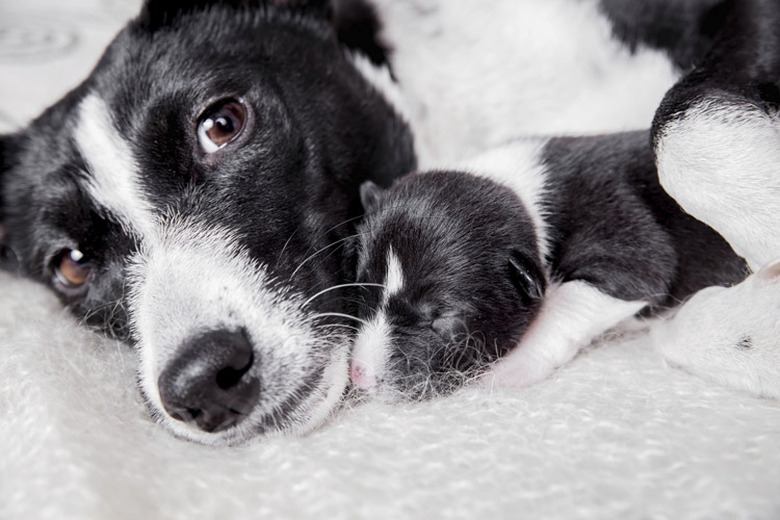Do Puppies Always Look Like Their Parents?
In a lineup, it may be difficult to pick out two puppies from the same litter, or identify a puppy's mother and father. Like humans, dogs may resemble their parents and their siblings, but also can exhibit some characteristics that even a good shake of the family tree might not explain.
It's All In the Genes
All species have a genetic makeup, which is passed along from both mother and father. Take dogs with black coats, for instance. The gene that produces a black coat is 'dominant,' therefore when a mother with a black coat is bred to a father of the same, it's highly likely (though never certain) that the offspring will be black in color. That is, unless both parents carry a recessive gene (from previous generations), such as a liver color. If both parents pass the recessive gene, the offspring will be liver colored, but the most likely result is a litter of black puppies. Recessive genes can lay dormant for years, and may reappear generations later.
Purebred vs. Mixed
Based on a study conducted by the University of California, Berkeley, the passing of specific traits responsible for the appearance of puppies is far more predictable when the parents are purebred. Mixed breed puppies are more likely to take on characteristics of both parents, and the likelihood that all puppies will look like the parents and their siblings, is far more slim. This research is supported by the introduction of crossbreeds such as the labradoodle. All labradoodles are similar in appearance, but finding two who look exactly alike may be little more than coincidence.
Below the Surface
Every puppy owner wonders what his adult pup will look like, but there are far greater considerations when looking at characteristics and genetics. While an adult male or female may not pass along their adorable ears to their offspring, they may pass along other traits not associated with appearance. Hereditary disease, for example, is a concern for all dog lovers, and some breeds are simply far more likely to inherit disease and medical issues from their parents. The Kennel Club now encourages all breeders to health test their breeding partners, but there is no guarantee they will do so. Temperament and personality have also been shown to transfer from parent to offspring and indeed, over the centuries, many dogs were bred on the basis of carrying on certain "desirable" personality traits.
The Dog in the Mirror
In the world of certainties, it's proven that the adorable puppy waddle will disappear over time, and as the pup grows, he may or may not resemble his parents. Despite studies of canine genetics, no one person can be absolutely sure how a puppy will develop or change as she ages. Far more important to the average dog owner is making certain his puppy grows up to be a healthy and well adjusted adult dog. Ongoing veterinary care is essential to ensure this will happen, and if rumor has it, your dog just might end up resembling you.
By Catherine Holden Robinson
References
Australian Shepherd Health & Genetics Institute; C.A. Sharp: In the Mode: How Traits Pass in Dogs, Lines and Breeds
University of California, Berkeley: Do Progeny Inherit Traits From Their Parents in Predictable Ways?
The Kennel Club: Tackling Inherited Diseases
About the Author
Catherine Holden Robinson is the award-winning author of "The House of Roses," and "Becoming Mona Lisa," the creator of the blog, Tommy's Tool Town, and has contributed articles as an animal advocate. Robinson resides in upstate New York, surrounded by pet hair.
